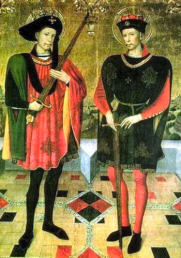
Another year is over... if interested, read what I wrote last year for the feast of the ancient Persian martyrs Abdon and Sennen.
Very little is known of them - oh, except that they died for the Faith of Christ, in true and unyielding witness to Him. It seems to me a good thing to celebrate such saints, about whom only what is essential is known: their perseverence to the end, by the grace of the Holy Ghost.
The Orthodox, too, hymn and feast these holy men, on this same date (the 30th of July) - but, in jurisdictions still adhering to the Julian calendar, this doesn't fall until the 12th of August according to the Gregorian calendar.
May they pray for us!
Here is the comment Dom Alban Butler makes about the marvellous constancy of the white-robed army of Christ's martyrs, in reference to these two saints:
The martyrs preferred torments and death to sin, because the love of God above all things reigned in their breasts. "We say we are Christians," says Tertullian; "we proclaim it to the whole world, even under the hands of the executioner, and in the midst of all the torments you inflict upon us to compel us to unsay it. Torn and mangled, and weltering in our blood, we cry out as loud as we are able to cry, That we are worshippers of God through Christ." Upon which Mr. Beeves observes, that no other religion ever produced any considerable number of martyrs except the true one. Do we ever read of any generation of men so greedy of martyrdom, who thought it long till they were upon the rack, and were so patient, so cheerful and stedfast under the most intolerable torments ? Socrates was the only philosopher that can be said to have died for his doctrine; and what a restless posture of mind does he betray, who was esteemed the best and the wisest of the heathens? With what misgivings, and fits, of hope sand fear, does he deliver himself in that most famous discourse, supposed to have been made by him a little before his death, about a future state? And neither Phaedo, Cebes, Crito, Simmias, nor any other of his greatest friends who were present at his death, durst maintain either his innocence, or that doctrine for which he died, in the Areopagus. With what reserve did Plato himself dogmatize concerning the gods whom he worshipped in public, but denied in private? How did he dodge about, disguise himself, and say and unsay the same excellent truths? Only the Christians suffered at this rate, and they held on suffering for several hundred years together, till they had subdued the world by dying for their religion. What could engage such a number of men in such a religion, and support them in it, in defiance of death in the most shocking forms, but evident truth, and a superior grace and strength from above?








No comments:
Post a Comment